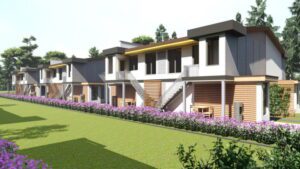
On July 1, the “Register of Destruction” is launched in Ukraine. With its help, homeowners whose houses and apartments were damaged as a result of hostilities and enemy shelling will be able to apply for compensation using the Diya application.
At the same time, the question of what the restored houses of Ukrainians will be like, taking into account the new realities and requirements for the housing stock after the war, remains no less important. The Open4business portal discussed these issues with Igor Stakovichenko, an expert in the field of construction and real estate.
“The introduction of the “Register of Destruction” will greatly simplify the procedure for compensating for damages for affected citizens. In fact, such a registry will bring together all the data on the destruction in the country. This will be very useful both for the state of Ukraine and for individual citizens when receiving compensation from the aggressor through international legal institutions,” the expert noted.
As for the new technologies that will be used in the construction of housing, here Stakovichenko recommends first of all to focus on the needs of society.
“What most people want from a new home, whose homes have been destroyed by the war, is reliability and security. The presence of equipped bomb shelters, convenient evacuation routes, autonomy – these are the criteria without which it is difficult to imagine post-war architecture,” Igor Stakovichenko stressed.
In his opinion, a good option would be the restoration and development of numerous recreational areas, some of which were abandoned even before the war. Stakovichenko believes that many Soviet-built sanatoriums and boarding houses, which have been practically not used for all the years of independence, can become a good platform for building eco-friendly settlements with autonomous service, since most of the communications have already been connected to them.
“Environmental friendliness and high technologies during construction will also become the hallmark of post-war architecture in Ukraine. Projects such as “zero energy houses”, or even “mini-power houses”, which are now being widely implemented in the EU, will also be popular after the war,” the expert added.
At the same time, Igor Stakovichenko sees no special prospects for aggressive development in the central areas of large cities, which was practiced before the war.
“Multi-apartment residential complexes in large cities will certainly continue to be built, but whether there is a buyer for such housing is already a question. I think many have already revised or will reconsider their views on comfortable housing as a result of the war,” the expert concluded.
CONSTRUCTION, EXPERT, FINANCY, IGOR STAKOVYCHENKO, MARKETS, REAL ESTATE, TECHNOLOGY, СТАКОВИЧЕНКО